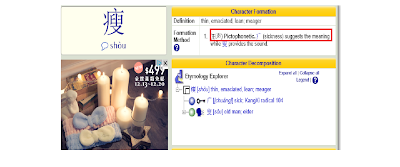Learn how to say "Merry Christmas" in Chinese on Youtube with us~~~
check this out
http://www.youtube.com/watch?v=2n7kkEQERcI&list=HL1387564041&feature=mh_lolz
2013年12月20日 星期五
2013年12月17日 星期二
How to say "thin“ in Chinese
The word 瘦(shòu) means “thin”, this is what the most of the women around are aiming at. But if you take a look at the radical of the word you will find our ancestors considered 瘦(shòu) as a sign of illness. Being skinny is being ill. So we can actually see the Chinese thinking through our characters. I hope you find it interesting. :)
2013年12月15日 星期日
Chinese Video Lessons
spent almost a whole day writing Chinese learning tips and doing video lesson~wow~~
this pic is the video i made today~~hahaha....
I'll send out learning tips tomorrow :)
you can check out our latest video on youtube!
http://www.youtube.com/watch?v=u5fXGhgVGZY
this pic is the video i made today~~hahaha....
I'll send out learning tips tomorrow :)
you can check out our latest video on youtube!
http://www.youtube.com/watch?v=u5fXGhgVGZY
Weekly Chinese learning tips! How to say IF in Chinese
Finally finished my second Chinese learning tips article.
:) if you are interested getting our free weekly learning tips,
please contact us here
smartmandarin1984@gmail.com
Katrina Lee
SMART Mandarin
:) if you are interested getting our free weekly learning tips,
please contact us here
smartmandarin1984@gmail.com
Katrina Lee
SMART Mandarin
2013年12月14日 星期六
2013年12月12日 星期四
Chinese Video Lesson
This is how my video lessons' quality will look like~
I'm very happy and proud of myself with what I've done so far with my own power!!
Chinese Video Lesson Quality~ :)
This is how my video lessons' quality will look like~
I'm very happy and proud of myself with what I've done so far with my own power!!
2013年12月11日 星期三
Student's Chinese Homework!
I'm so proud of my student~
makding Chinese sentence and writing characters :)
If you take a closer look, one of the sentences says : My teacher will marry a man she never met.
haha.....
2013年12月9日 星期一
Do I need to learn Chinese characters?
你 好
Hi!
Thank
you for reading our very first Chinese learning tips article. J
This is Katrina Lee from SMART
Mandarin.
I’ve been teaching Mandarin for more than three years, and I’m here
glad to use my expertise and experience in my classes to assist you with some common
questions you might have when learning Chinese.
1. Student: Katrina, I don’t want to learn recognizing
and writing Chinese characters, because those characters seems difficult and
complicated to learn, is it possible to learn without reading and writing also
be fluent in Chinese?
Yes, it is possible to be
fluent in speaking and listening without learning writing and reading in
Chinese. It is possible, but NOT EVERYONE can be like that.
I have some students
only learning listening and speaking and they are quite fluent in Chinese, but
they are only rare few cases. The reason
is when people learning only pinyin, all they can recognize from the book is the
English alphabet combinations which is pinyin, but not the real Chinese words.
In the
beginning, they find it easy to acquire only using pinyin, but the more they
learn, the more challenges they face. First of all, there are so many words
with the exact same pronunciation and tone.
Let me take
an example : newspaper
is called “報紙”(traditional
Chinese) “报纸”(Simplified
Chinese) in
Chinese, and only in Chinese is called “只”(traditional
& simplified) 。 So if you want to say, I only have one newspaper.
Then we say “我只有一份報紙”(traditional)
“我只有一份报纸”(simplified) , if we only look at the pinyin, we’ll see the pinyin combination “zhi”
twice! So you might bit a little bit confused translating this sentence as “I
paper have one paper only” or “ I only have one only…” ??!!
It’s quite
troublesome figuring out those things.
This example
is only one minor problem you need to deal with, what if you’re reading a whole
paragraph or conversation in pinyin only!?
By learning
Chinese characters, you can easily tell the meaning of a sentence with less confusion,
and the more words you know or you learn, the easier it gets to understand a
paragraph in Chinese, because most of the Chinese characters obsess a meaning
or few meanings in it. So when you see the character, you know the meaning and pronunciation
altogether.
This is just
my personal opinion, if you find it helpful, then I’m glad that this reading helps.
If you have different opinions or questions, please feel free giving me your
voice, I’ll appreciate it! :)
I’ll be sending out my Chinese learning tips at
least every week. The learning tips are for encouraging people to learn more,
share ideas. All the opinions and questions will be appreciated.
Katrina Lee
2013年12月1日 星期日
The difference between 根本 & 并不
The difference between 根本 & 并不
1. 根本 means "simply"
according to Chinese textbook
you can use 根本 in a positive or negative sentence
positive sentence: 我觉得他根本就是一个白痴。 (I think he's simply just an idiot!)
negative 我根本不懂他在说什么。( I simply just don't understand what he's talking about.)
The two examples above, you can see that "根本“ is focusing on emphasizing the statment which you are trying to express.
First example : 我觉得他根本就是一个白痴。 so 他是一个白痴 (he's an idiot.) is the idea of the sentence, and 根本 is just for
emphasizing the idea.
So you can express the same idea without 根本, just say "我觉得他是一个白痴" (I think he's an idiot!)
You are not changing the meaning without 根本,but the the tone of expressing your idea/thoughts is less strong.
2. 并不 means "actually not" according to textbook
mainly used to deny other people's ideas
ie :
A : 你工作了十个小时,应该很累吧。( You worked for 10 hours, you're probably very tired.)
B: 虽然工作了十个小时,但是我并不累。( Actually I'm not tired, although i worked for 10 hours already)
In this conversation, A is assuming B would be very tired after 10 hours of working, but B isn't tired.
So by saying 并不累 (actually not tired), B clearly states he's not tired also denying A's assumption.
Hope those examples and explanation help!
Sometimes reading more examples help understand Chinese more.
Because there are many things/vocabs in Chinese can't be translated in English. :)
The meaning of 会 能 可以 and usage in Chinese
The meaning of 会 能 可以 and usage in Chinese
The meaning of 会 could be translated as "know how to"
ie, 我会说中文。 I know how to speak Chinese.
我会做饭。 I know how to cook.
and 能 use in differnt meanings
1. physically able to....
ie 孩子太小,还不能做饭。
这个西瓜太大,我不能拿。
2. not allowed to ....due to a circumstance..
ie 我不能喝酒,因为我得开车。
他在工作,所以不能休息。
3. also means "May I..?“ and this meaning also can be replaced by "可以” asking for permissions
ie 妈妈,我能看电视吗?/ 妈妈,我可以看电视吗?
ie 我没有钱了,你能借给我一点钱吗? / 我没有钱了,你可以借给我一点钱吗?
I hope that answer helps you :)
SMART Mandarin
Katrina Lee
Building spontaneous thinking/speaking in Chinese
How to build spontaneous thinking/speaking in Chinese?
Here is my advice
For beginners, listening to CDs, conversations few more times, then repeat after that many times.
Of course, if there's any sentence you find helpful, you should write it down.
for example, if you are listening to this conversation:
A: 你昨天买了什么? (what did you buy yesterday?)
B : 我昨天什么都没买!( I didn't buy anything yesterday)
in this conversation, 什么都没+ V means "not at all"
so 我 昨天 什么都没 买 literally means ( I didn't buy anything at all yesterday)
It's a useful one to learn!
If I were learning Mandarin, I would definitly write this pattern down.
Say few more times until I'm very fluent with it.
Then I try to paraphrase.
我什么都没 吃。 I didn't eat anything at all.
我什么都没 做。 I didn't do anything at all.
我什么都没 说。 I didn't say anything at all
repeat your new sentences few more times and picture different situations where you can use those sentences.
Then next time, when you come acroos the scenario you need to use those patterns, the sentence
will just pop up to your head then you can say it with no thinking.
訂閱:
文章 (Atom)









